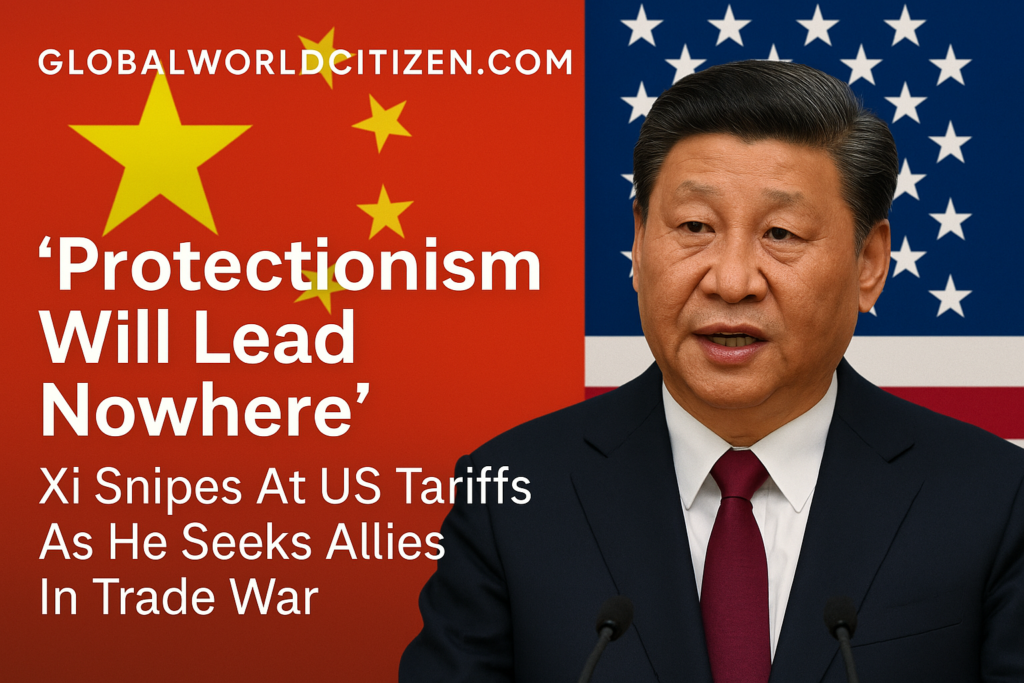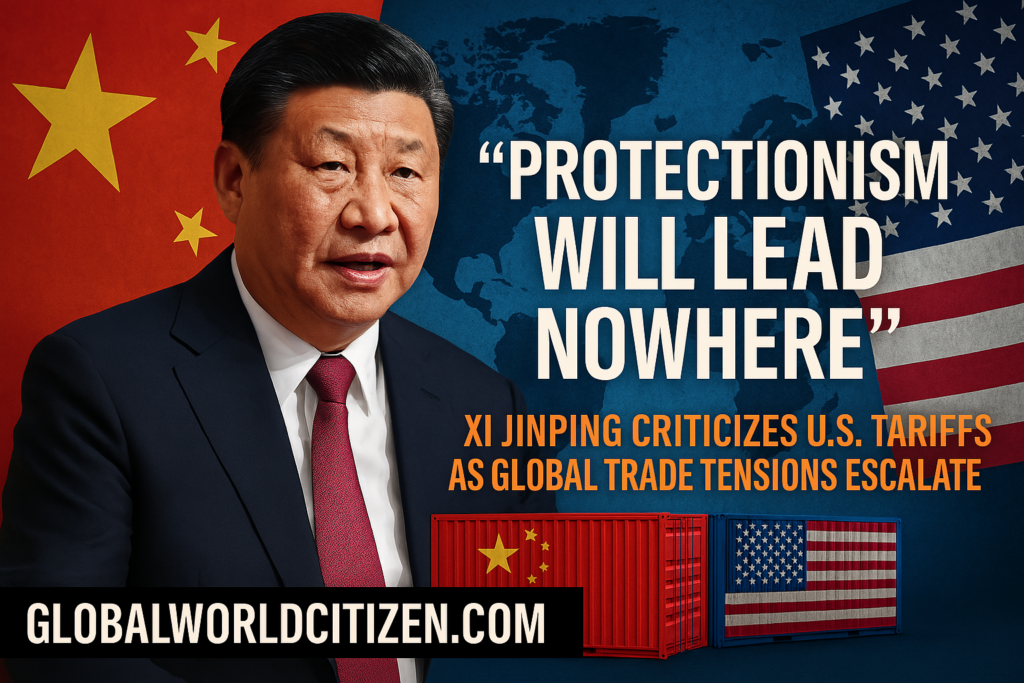Published: April 14, 2025
 By: Global Economy & Geopolitics Desk
By: Global Economy & Geopolitics Desk
 Source: GlobalWorldCitizen.com
Source: GlobalWorldCitizen.com
 Xi Jinping Criticizes U.S. Tariffs, Defends Multilateral Trade
Xi Jinping Criticizes U.S. Tariffs, Defends Multilateral Trade
As the U.S.-China trade war intensifies in 2025, Chinese President Xi Jinping has issued a direct rebuke of the Trump administration’s escalating tariff strategy. Speaking during a diplomatic mission to Vietnam, Xi denounced economic protectionism and called for a return to global trade cooperation, reinforcing Beijing’s stance as a defender of the multilateral trading system.
“Protectionism will lead nowhere.”
— Xi Jinping, President of China
Xi’s remarks, published in state-run media across Asia, serve as a thinly veiled response to the latest U.S. tariff announcements, particularly new levies on semiconductors, electronics, and the global tech supply chain.
 U.S. Tariff Flip-Flop Rekindles Global Market Fears
U.S. Tariff Flip-Flop Rekindles Global Market Fears
Just hours before Xi’s editorial, President Donald Trump announced that previous tariff exemptions on electronic goods would soon end. In a viral Truth Social post, Trump warned:
“Nobody is getting off the hook. We’re taking a hard look at semiconductors and the WHOLE ELECTRONICS SUPPLY CHAIN under National Security Tariff Investigations.”
The reversal follows a brief tariff pause that had temporarily calmed global stock markets. Now, under Trump’s new directive, tariffs on Chinese electronics could reach 145%, combining:
20% “fentanyl-linked” tariff
125% reciprocal tariff response from the prior week
 Beijing’s Response: Strategic, Not Symmetrical
Beijing’s Response: Strategic, Not Symmetrical
China’s Ministry of Commerce criticized the U.S. tariff moves as short-sighted and damaging to global growth. While acknowledging the electronics exemption as “a small correction,” officials demanded a full rollback and quoted a Chinese proverb:
“The one who tied the bell must untie it.”
Simultaneously, China’s Foreign Ministry accused the U.S. of using trade as “a geopolitical weapon for selfish gain,” while signaling closer collaboration with the European Union to uphold multilateral trade norms and resist economic nationalism.
 Xi Expands Global Trade Ties Across Asia and Europe
Xi Expands Global Trade Ties Across Asia and Europe
Xi’s Vietnam visit is part of a broader diplomatic push to counter U.S. pressure by strengthening ties with the Global South and key European nations:
Spain: Xi urged Prime Minister Pedro Sánchez to stand with China in opposing “unilateral bullying.”
Malaysia & Cambodia: Upcoming visits to expand infrastructure, energy, and trade cooperation.
Vietnam Op-Ed: Emphasized safeguarding global supply chains, defending the World Trade Organization, and building South-South partnerships.
 GlobalWorldCitizen.com Insight: Protectionism vs. Globalism
GlobalWorldCitizen.com Insight: Protectionism vs. Globalism
As Washington embraces aggressive tariffs, Beijing is leaning into diplomacy, economic integration, and multilateral leadership. But while the two superpowers square off, the ripple effects of their trade war are destabilizing global markets, disrupting supply chains, and leaving everyday consumers — especially in emerging economies — vulnerable to inflation and shortages.
Critical Questions We Must Ask:
Will escalating tariffs spark a new global recession?
Can the WTO and global trade institutions survive rising nationalism?
How can global citizens and small nations assert their voice in the economic power struggle?

 Final Word from GlobalWorldCitizen.com
Final Word from GlobalWorldCitizen.com
This is more than a trade disagreement — it’s a battle over the future of the global economy. Will the world move toward economic fragmentation or international collaboration? The answer will shape everything from inflation and technology to climate policy and political stability.

-
Real-time analysis of U.S.-China-EU trade developments
-
In-depth coverage of tariff impacts on supply chains & citizens
-
Global perspectives from experts, economists, and emerging voices


